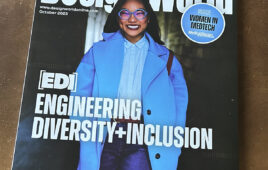Yueying Liu, Senior Manager, RF Device Modeling and Device Characterization, Wolfspeed
PhD, Solid State Physics and Microelectronics, North Carolina State University, 2009
Yueying Liu achieved her PhD in Solid State Physics and Microelectronics from North Carolina State University in 2009. Her PhD thesis focused on large-signal physics and AlGaN/GaN HEMT device modeling in collaboration with Prof. Robert J. Trew and Prof. Griff Bilbro. After graduation, she joined Triquint as a device modeling engineer for the product design team. Before joining Wolfspeed, Yueying worked at Infineon, Morgan Hill as an RF power amplifier (PA) designer in the advance technology development group and worked on class AB PA designs using GaN devices. She joined Wolfspeed in 2014 as an RF Application Design Engineer and has worked on multiple projects in various roles. In 2016, Yueying joined the MMIC design team as a manager for the RF device modeling/characterization group. The group’s objective is to provide models and PDKs that facilitate engineers’ first-pass design success, allowing the engineer to achieve the specified performance targets. Yueying has co-authored more than 15 publications and holds three patents. She also serves as the compound semiconductor modeling sub-committee chair for the IEEE BCICTS conference.

Talk about the culture at your company. What makes it inclusive or supportive of women in engineering and automation?
The leadership at Wolfspeed promotes integrity, respect, ingenuity, passion, ownership and accountability as the Wolfspeed values. Our team genuinely appreciates the varied talents and productive results that each person offers on both a technical and project level. Good ideas and innovative work are always valued and promoted here, regardless of what the person’s gender is. Being a woman and working at Wolfspeed, I receive the same recognition and opportunity as everyone else. The company culture is inclusive and enables everyone to achieve success in each project as a team and in each business opportunity as a company. As a matter of fact, I’ve noticed a lot of female engineers being hired in the department to promote more women engineers in the RF industry.
What first drew you to engineering and this industry?
I’ve always been curious about how micro-devices work in real circuits, even when I was young. One of the biggest influences on me was my Dad. He was a high school physics teacher and made a giant radio (size of a microwave) back in the late ’60s for my Mom as a wedding gift. It fascinated me at the time. How could a voice and music come out of a box? His early mentoring on microwave and wireless communication surely opened up a door for me at a very young age.
When I went to college, physics and electronics were always my favorite subjects of all the courses I’ve taken. They sort of connect the dots for me and help solve the mysteries I have had since when I was a child. In the later years of my studies at graduate school, I found it most rewarding to troubleshoot technical problems and eventually, how to solve them. The more I dove into circuit technology, the more challenging and rewarding it became. That’s probably why I’ve chosen this path and will continue on.
Describe your biggest career challenge, How did you solve it – or what was the outcome or lesson learned?
As an RF device modeling manager, my job is to align our modeling team roadmap with our technology and business development goals and allocate resources within the team to ensure modeling needs for internal and external designers are met. GaN is at an exciting transition point and our business is growing very rapidly. The demands for modeling/PDK support have increased dramatically for both customers and new technology development. It’s a very challenging environment with lots of opportunities to take responsibility and further career development. To support the business growth, we have adopted a lot of automation and quality control processes in testing, modeling/PDK development, and documentation. This has enabled us to double our work throughput and still maintain the high-quality product standards we continue to deliver to our customers.
What career advice would you give to your younger self?
I would advise her to be more confident and bolder with exploring new opportunities. Learn as much fundamental knowledge as you can at school and continually stay informed of new technologies in the industry. Seek opportunities to conduct hands-on testing and industry design work, this would provide an advantage in starting a career. Also, searching for a position and a company that offers good mentors can help develop important skill sets.
Filed Under: Engineering Diversity & Inclusion




